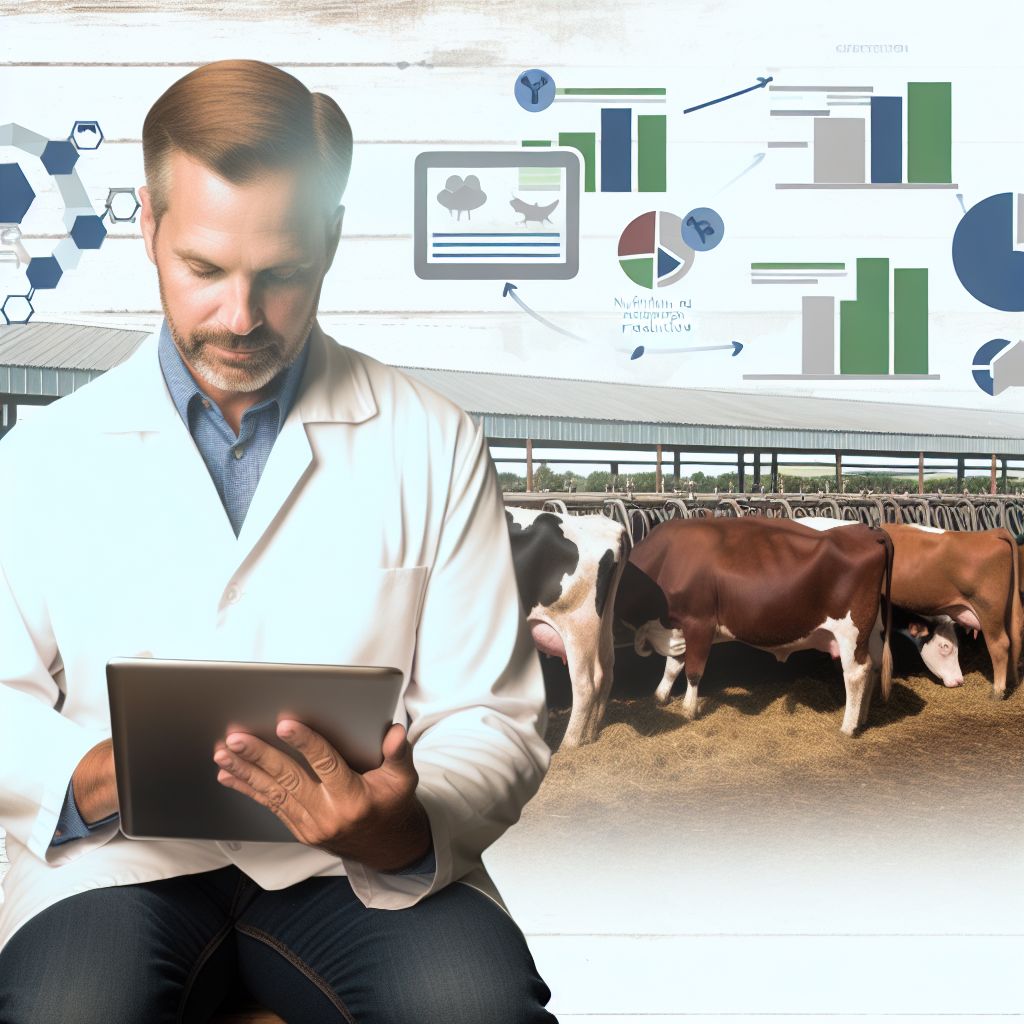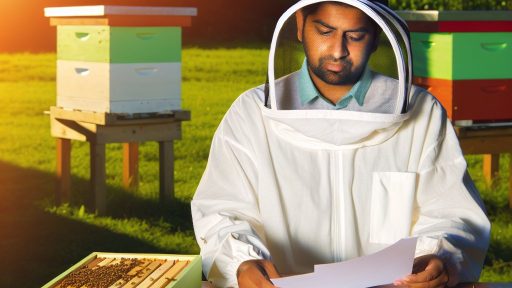Understanding the Basics of Livestock Nutrition
Essential Nutrients for Livestock
Livestock require a balanced diet to thrive.
This diet includes carbohydrates, proteins, fats, vitamins, and minerals.
Each nutrient plays a distinct role in animal health and production.
For instance, proteins support growth and tissue repair.
In contrast, carbohydrates provide energy for everyday activities.
Fats are energy-dense and aid in the absorption of certain vitamins.
Vitamins and minerals support various metabolic processes.
Differentiating Between Types of Livestock
Different species have unique nutritional needs.
Cattle, for example, primarily graze on pasture, requiring high-fiber diets.
On the other hand, poultry require higher protein levels in their feed.
Understanding these differences ensures optimal growth and productivity.
Farmers must adjust rations based on the type of livestock.
The Importance of Water
Water is a critical but often overlooked nutrient.
Livestock need adequate water intake for various biological functions.
Hydration supports digestion, nutrient absorption, and temperature regulation.
Transform Your Agribusiness
Unlock your farm's potential with expert advice tailored to your needs. Get actionable steps that drive real results.
Get StartedFarmers should ensure easy access to clean, fresh water at all times.
Factors Influencing Nutritional Requirements
Age, weight, and production stage affect nutritional needs.
Young animals necessitate different diets compared to adults.
Pregnant or lactating females have increased nutrient demands.
Environmental conditions, such as temperature and humidity, also play a role.
Farmers must frequently assess these factors to optimize feeding strategies.
Using Feed Additives
Feed additives can enhance livestock nutrition.
Probiotics, for example, improve gut health and digestion.
Mineral supplements may prevent deficiencies and support overall health.
Farmers should consult with a nutritionist before using these additives.
Importance of Balanced Diets for Meat and Dairy Production
Enhancing Animal Health
Balanced diets play a crucial role in enhancing animal health.
Nutritionally adequate feed helps prevent diseases.
Well-nourished animals show improved immune responses.
Consequently, this leads to better overall productivity.
Maximizing Growth Rates
Proper nutrition significantly maximizes growth rates in livestock.
Animals receiving balanced diets grow faster and healthier.
This translates directly into higher meat yields.
Moreover, it supports efficient milk production in dairy cows.
Improving Reproductive Performance
Nutrition impacts reproductive performance significantly.
Well-fed animals have higher conception rates.
This ensures a consistent supply of offspring.
Additionally, healthier animals give birth to healthier young.
Enhancing Product Quality
Balanced nutrition influences the quality of meat and dairy products.
Animals with proper diets produce tastier meat.
Showcase Your Farming Business
Publish your professional farming services profile on our blog for a one-time fee of $200 and reach a dedicated audience of farmers and agribusiness owners.
Publish Your ProfileFurthermore, their milk contains higher butterfat and protein levels.
These quality improvements can boost market value.
Ensuring Sustainable Practices
Implementing balanced diets supports sustainable livestock production.
It reduces feed waste and enhances resource utilization.
Thus, farmers can meet demand without overexploiting resources.
This approach promotes long-term agricultural sustainability.
Key Nutritional Requirements for Different Livestock Species
Cattle Nutrition
Cattle require a balanced diet for optimal growth and milk production.
Their primary nutritional needs include carbohydrates, proteins, fats, vitamins, and minerals.
For instance, protein is essential for muscle development.
Additionally, calcium and phosphorus support strong bone structure.
Cattle also benefit from high-fiber diets to promote healthy rumen function.
As a result, incorporating forages is critical in their daily intake.
Poultry Nutrition
Poultry nutrition significantly impacts egg production and meat quality.
Chickens require a diet rich in protein, primarily from soybean meal or fish meal.
Moreover, they need adequate calcium for eggshell formation.
Vitamins A, D, and E play vital roles in their overall health.
Water quality is also crucial, as it directly affects feed intake and performance.
Therefore, providing clean, fresh water is imperative for healthy poultry.
Swine Nutrition
Swine require specific nutrients to optimize their growth rates and health.
Protein is particularly important for young pigs to promote rapid growth.
Furthermore, energy-rich grains like corn serve as significant calorie sources.
Minerals such as salt and trace elements enhance their immune function.
A balanced vitamin intake supports healthy skin and reproduction.
Consequently, formulating appropriate rations is essential for swine farmers.
Sheep Nutrition
Sheep have unique dietary requirements based on their breeding and growth stage.
They require high-fiber feeds, like silage and hay, for optimal digestion.
Additionally, protein is crucial, especially during gestation and lactation.
Minerals including copper and zinc contribute to overall health and wool quality.
Providing adequate vitamins can prevent developmental issues in young lambs.
Thus, monitoring sheep nutrition contributes to herd profitability.
Explore Further: Organic Livestock Farming for Meat Production
The Role of Protein in Livestock Growth and Lactation
Importance of Protein in Growth
Protein plays a crucial role in the growth of livestock.
It is essential for muscle development and overall body structure.
Without adequate protein, animals may fail to reach their growth potential.
Furthermore, protein influences various bodily functions.
This includes hormone production, immune response, and enzyme activity.
Thus, a protein-rich diet supports robust health in livestock.
Protein Requirements for Different Species
Various species have unique protein needs.
Cattle typically require higher levels during growth phases.
Pigs need a balanced protein intake to maximize lean muscle development.
Showcase Your Farming Business
Publish your professional farming services profile on our blog for a one-time fee of $200 and reach a dedicated audience of farmers and agribusiness owners.
Publish Your ProfileChickens also benefit from adequate protein for optimal egg production.
Clearly, understanding species-specific needs is crucial for effective nutrition.
Protein Sources for Livestock
Livestock diets can include diverse protein sources.
Common sources include soybean meal, canola meal, and alfalfa.
Fishmeal provides high-quality protein but at a higher cost.
Furthermore, many producers use by-products from grains for protein.
This allows for an efficient use of available resources.
The Role of Protein in Lactation
Protein intake directly affects milk production in dairy animals.
Higher protein levels often result in increased milk yield.
Additionally, protein enhances the quality of milk produced.
It influences the fat and protein content in dairy products.
Adequate protein is essential during peak lactation periods.
Protein Quality and Digestibility
Not all proteins are created equal.
The quality of protein sources impacts their effectiveness.
Highly digestible proteins lead to better nutrient absorption.
Producers should focus on feeds that provide amino acid balance.
This ensures that livestock can efficiently utilize protein in their diets.
Monitoring and Adjusting Protein Levels
Regularly assessing protein levels is vital for optimal livestock productivity.
Field tests can help determine the protein content in feed.
Adjustments may be necessary based on growth stages or production goals.
Farmers should collaborate with nutritionists for tailored feeding strategies.
By doing so, they can effectively meet the protein needs of their livestock.
Uncover the Details: Importance of Water Quality and Hydration in Swine Rearing
Vitamins and Minerals Essential for Optimal Health and Production
Importance of Vitamins
Vitamins play a critical role in livestock nutrition.
They support various biological functions and enhance overall health.
Additionally, vitamins contribute to productivity in meat and dairy systems.
For example, vitamin A is essential for maintaining vision and immune function.
Moreover, vitamin D aids in calcium absorption for strong bones.
Finally, vitamin E acts as an antioxidant, protecting cells from damage.
Key Minerals for Livestock
Minerals are equally vital for livestock health and performance.
They help in enzyme function and metabolic processes.
Calcium and phosphorus are crucial for bone development in young animals.
Magnesium supports muscle function and nerve transmission.
Sodium and potassium are essential for maintaining fluid balance.
Trace minerals like zinc, copper, and selenium also play significant roles.
Balancing Nutrient Intake
Balancing vitamins and minerals ensures optimal health and production.
Livestock require specific ratios of nutrients based on their life stage.
For instance, growing animals need more proteins and minerals than mature ones.
Additionally, lactating females have higher vitamin and mineral requirements.
Consequently, balanced feeding programs enhance productivity and health.
Showcase Your Farming Business
Publish your professional farming services profile on our blog for a one-time fee of $200 and reach a dedicated audience of farmers and agribusiness owners.
Publish Your ProfileMonitoring Nutrient Levels
Regularly monitoring nutrient levels is essential for livestock management.
Veterinarians and nutritionists should work together on this task.
Routine blood tests can help assess vitamin and mineral deficiencies.
Furthermore, feed analysis ensures nutritional adequacy in diets.
Effective monitoring leads to timely adjustments in feeding strategies.
Implementing Supplementation Strategies
In some cases, supplementation is necessary to meet livestock needs.
Targeted supplements can address specific deficiencies found in the diet.
For example, mineral blocks provide essential trace minerals on-demand.
Liquid supplements can ensure adequate vitamin intake in critical growth phases.
However, over-supplementation can lead to toxicities.
Therefore, it’s critical to follow expert recommendations on dosages.
Learn More: Weed Control Methods for Maintaining High-Quality Pastures
Impact of Feed Quality on Meat and Dairy Yields
Importance of Feed Quality
High-quality feed plays a crucial role in livestock production.
It enhances the nutritional intake of animals significantly.
Quality feed promotes better growth rates in meat-producing livestock.
In dairy cattle, it leads to increased milk production.
Farmers must prioritize feed quality to boost overall yields.
Type of Feed Ingredients
The choice of feed ingredients directly affects livestock health.
For instance, protein-rich feeds improve muscle development.
Grains provide essential energy needed for daily activities.
Additionally, minerals and vitamins are vital for optimal growth.
Farmers should source high-quality ingredients for their livestock.
Impact on Growth and Lactation
Feed quality influences both growth rates and milk production.
Animals consuming superior feed gain weight more efficiently.
This efficiency leads to quicker turnaround times for meat production.
In lactating cows, better feed yields higher milk volumes.
Consequently, farmers can meet consumer demands more effectively.
Long-Term Benefits of Quality Feed
Investing in high-quality feed offers advantages beyond immediate gains.
It promotes overall animal health and reduces veterinary costs.
Healthy animals contribute to sustainable farming practices.
Moreover, the nutritional content of meat and dairy improves.
This enhancement can lead to better market prices and consumer satisfaction.
Discover More: Drought-Resistant Forage Crops for Sustainable Grazing

Strategies for Formulating Rations to Meet Nutritional Needs
Importance of Balanced Nutrition
Balanced nutrition is essential for optimizing livestock production.
It enhances both meat and dairy yields effectively.
Additionally, it fosters overall animal health and well-being.
Understanding Nutritional Requirements
Understanding the specific needs of each species is critical.
Cattle, sheep, goats, and poultry have differentiated requirements.
For instance, ruminants require more fiber compared to non-ruminants.
Macronutrients and Micronutrients
Macronutrients include proteins, carbohydrates, and fats.
Showcase Your Farming Business
Publish your professional farming services profile on our blog for a one-time fee of $200 and reach a dedicated audience of farmers and agribusiness owners.
Publish Your ProfileProteins are vital for growth and muscle development.
Carbohydrates provide necessary energy for daily activities.
Fats contribute to energy reserves and assist in nutrient absorption.
Micronutrients, while needed in smaller quantities, are equally important.
Vitamins and minerals play crucial roles in metabolic processes.
Evaluating Feed Ingredients
Quality feed ingredients determine the efficacy of rations.
Regular evaluation of feedstuffs ensures nutritional adequacy.
Conducting laboratory tests on feed can help identify deficiencies.
Types of Feed Ingredients
- Legume forage provides high protein levels.
- Cereal grains offer excellent energy sources.
- By-products, such as molasses, can enhance palatability.
Formulating Rations
Formulating effective rations requires a systematic approach.
Using software or feed formulation tools can streamline this process.
Consideration of feed availability and cost is also important.
Energy, Protein, and Fiber Balance
The balance of energy, protein, and fiber is crucial.
Excess energy can lead to obesity, while insufficient nutrients impair growth.
Therefore, monitoring animal growth and adjusting rations as needed is essential.
Implementing Feeding Strategies
Implementing strategic feeding practices can enhance production.
Group feeding allows for better management of dietary needs.
Moreover, adjusting feeding times can affect feed efficiency.
Behavior and Feeding Habits
Understanding animal behavior aids in designing feeding systems.
For example, cattle prefer grazing at specific times during the day.
Accommodating these habits can improve intake and productivity.
Monitoring and Adjusting Rations
Regular monitoring of livestock performance is necessary.
Weight gain, milk production, and overall health indicators are key metrics.
Based on data collected, make necessary adjustments to the rations.
Feedback and Continuous Improvement
Seek feedback from feed nutritionists and veterinarians regularly.
Continuous improvement ensures the effectiveness of feeding strategies.
This approach also supports sustainable livestock production practices.
The Influence of Feeding Practices on Animal Performance
Impact of Nutritional Ingredients
Nutritional ingredients play a crucial role in livestock production.
They directly affect growth rates and overall health.
Essential nutrients include proteins, carbohydrates, and fats.
Each nutrient type serves a distinct purpose in animal growth.
For example, proteins are vital for muscle development.
Carbohydrates supply energy for daily activities.
Conversely, fats provide concentrated energy sources.
Balancing Rations for Optimal Results
Balancing rations enhances overall animal performance.
This practice ensures all nutritional needs are met.
Proper balancing prevents deficiencies or excesses.
For instance, inadequate protein leads to stunted growth.
On the other hand, too much energy can cause obesity.
Regular assessments can optimize feeding strategies.
Consideration of growth stage influences ration adjustments.
Showcase Your Farming Business
Publish your professional farming services profile on our blog for a one-time fee of $200 and reach a dedicated audience of farmers and agribusiness owners.
Publish Your ProfileChoosing Quality Feed Sources
Feed quality affects animal performance significantly.
High-quality feed supports better digestion and nutrient absorption.
Moreover, contaminants can negatively impact health.
It is vital to source feed from reputable suppliers.
Farmers should prioritize feed testing to ensure safety.
Utilizing locally sourced ingredients can boost quality.
Feeding Frequencies and Schedules
Feeding frequencies impact animal eating behavior.
Regular schedules promote better digestion and nutrient uptake.
Livestock typically perform better with multiple small meals.
This approach reduces competition among animals.
Additionally, it enhances overall feed conversion efficiency.
The Role of Research and Development
Ongoing research helps improve livestock nutrition.
Innovative feeding practices emerge from scientific studies.
Farmers should keep abreast of nutritional advancements.
Utilizing research can lead to higher productivity levels.
Collaboration with nutritionists enhances feeding strategies.
Innovations in Supplementing Livestock Diets for Enhanced Production
Importance of Nutrition in Livestock Production
Nutrition significantly impacts livestock performance and productivity.
Optimal diets enhance growth rates and overall health.
Healthy animals produce higher quantities of meat and dairy.
Thus, understanding nutritional requirements is essential for farmers.
Emerging Supplementation Technologies
New technologies in feed supplementation are advancing rapidly.
Microencapsulation techniques improve nutrient stability.
This method ensures nutrients are delivered effectively to livestock.
Moreover, fermentation processes enhance feed digestibility.
Utilizing probiotics has shown promising results in animal health.
Biofortified Feeds
Biofortification increases the nutritional value of feeds.
This innovation addresses nutrient deficiencies in livestock diets.
For instance, feeding cattle biofortified grains boosts vitamin content.
Pigs receiving fortified feed show improved growth rates.
Alternative Protein Sources
With rising feed costs, alternative protein sources are gaining attention.
Insects are becoming a viable protein supplement for livestock.
They are nutrient-rich and environmentally sustainable.
Additionally, utilizing by-products from the food industry minimizes waste.
These practices contribute to a circular economy in agriculture.
Inclusion of Plant-Based Additives
Plant-based additives improve gut health and enhance feed efficiency.
For example, seaweed has shown potential in reducing methane emissions.
Moreover, essential oils improve palatability and digestion.
Incorporating these additives can lead to better livestock performance.
Precision Feeding Techniques
Precision feeding optimizes nutritional inputs according to individual needs.
This approach tailors diets based on specific animal requirements.
Showcase Your Farming Business
Publish your professional farming services profile on our blog for a one-time fee of $200 and reach a dedicated audience of farmers and agribusiness owners.
Publish Your ProfileThe use of technology helps farmers analyze and adjust diets.
Consequently, this results in more efficient feed utilization.
Use of Data Analytics
Data analytics provides insights into livestock diets and health.
Farmers can monitor animal performance through real-time data.
This facilitates timely adjustments to feeding strategies.
To sum up, data-driven decisions enhance livestock management.
Sustainable Practices in Feeding
Sustainability is crucial in modern livestock nutrition.
Farmers are adopting practices that reduce environmental impact.
Integrating local feed sources minimizes transportation emissions.
Furthermore, sustainable practices enhance soil health and biodiversity.
Regenerative Agriculture Approaches
Regenerative agriculture promotes healthy ecosystems.
This method emphasizes maintaining soil fertility for livestock feed.
Additionally, it focuses on carbon sequestration to combat climate change.
Ultimately, these practices benefit both livestock and the environment.
Additional Resources
How to Optimize Calf: AABP forum | Mariana Guerra Maupome …
Post-weaning feed efficiency decreased in progeny of higher milk …




